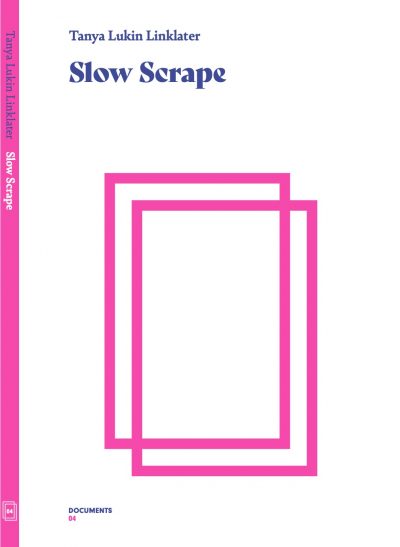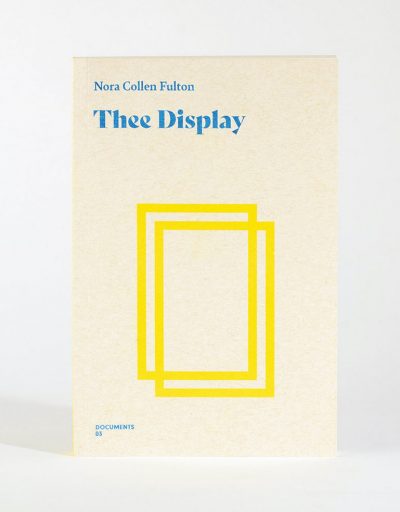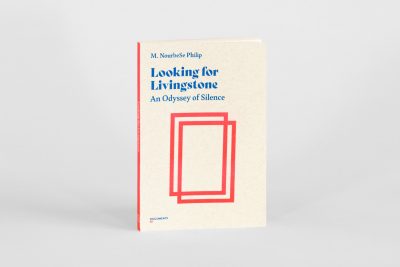
Editors
Nathan Brown is Associate Professor of English, Canada Research Chair in Poetics, and Founding Director of the Centre for Expanded Poetics at Concordia University. He is the author of The Limits of Fabrication: Materials Science, Materialist Poetics (Fordham UP, 2017) and the poetry chapbook January (Broken Dimanche, 2017).
Michael Nardone is a postdoctoral fellow in the department of French Literature at the Université de Montréal, and an affiliated faculty member of the Centre for Expanded Poetics, Concordia University. He is the author of two books of poetry: The Ritualites (2018) and Transaction Record (2014).
Tell us a bit about your press. How did you start? Who are your influences, in Canada and beyond? What is your mission?
DOCUMENTS grew out of collaborative work at the Centre for Expanded Poetics, a research space for the study of interdisciplinary poetics that was launched at Concordia in 2015. We acquired a Risograph Digital Duplicator and started organizing workshops with designers like JP King and M Wright, working withpoets/artists like Jessica Bebenek, Jovi Schnell, Bretta Walker, and Jean-Jacques Martinod, while collaborating with groups like Concordia’s Queer Print Group. DOCUMENTS grew out of this collaborative energy, and we partnered with Anteism press to publish collectively produced books printed on the Risograph and designed by Kevin Lo at LOKI graphic design.
We’re influenced by the mimeograph culture of the New York School in the 60s and 70s, by early Coach House chapbooks, by anarchist/communist and DIY printing practices (pamphlets, booklets, broadsides), and by collaborative, interdisciplinary research contexts like Black Mountain College.
Our aim is to publish work attesting to the multiplicity of practices, techniques, and modes of theoretical intelligence that inform contemporary poetics. If poetics refers to the theory of poetry (its forms, histories, critical categories) it is also the theory of poiesis (of making), and this larger field draws it beyond the boundaries of poetry as a specifically literary activity. As we study this tension between poetry and poiesis, we want to document its contemporary transformations by publishing texts that have shifted and sharpened the focus of our attention to philosophical problems, embodied histories, political contradictions, artistic experiments, and scientific models of structure and form.
What about small press publishing is particularly exciting to you right now?
What really excites us is the relay between poetics and publishing: the way poetic experiments can be enabled by printing practices and then feed back into thinking about poetry as examples of what it can make manifest. As our list expands, we want it to reflect all the different things going on at the Centre for Expanded Poetics: philosophy seminars, work on the intersection of poetry and science, craft practices at the intersection of textiles and poetics, film screenings, etc.
How does your press work to engage with your immediate literary community, and community at large?
DOCUMENTS started as a collaboration between Anteism and the Centre for Expanded Poetics—Anteism embedded in artworld publishing, the CEP in a university research context. Our collaboration has allowed us to organize art exhibitions stemming from artist’s books (Bretta Walker’s My Dirty Cunt and Me) and book publications stemming from exhibitions (we’ll publish a book by Alexi Kukuljevic in 2021, after organizing a show of his artworks in winter 2020). Jovi Schnell joined us from San Francisco for a collaborative workshop on making her book Electric Space Gardner’s in 2019. We conceive of publishing as a nodal point for connections among all kinds of different events and ideas, so the books we publish under the DOCUMENTS imprint (four so far) are connected with lots of side projects and other publishing initiatives that flow through both Anteism and the CEP.
Tell us about three of your publications. What makes them special, needed, and/or unique?
What’s unique about all of our books is that the Risograph is at the core of their production and the conception of their design. The retro, screenprinted, glitchy look of Risograph printing implies a provisional approach to the final product the process and the conception of the work being as important as the physical book, while the book itself embodies that process.
The first book we published, Devin Wangert’s Dead Time: Intolerable Images and the Politics of Banality is a work of philosophy and film theory that closes with a reading of Maggie Nelson’s Bluets. That’s a good example of the conceptual and
generic intersections we want to encourage.
M. NourbeSe Philip’s Looking for Livingstone is a reprint of her first book: “documents” means that part of our project is archival—to find and republish examples of the kind of work we’ve learned from. NourbeSe’s incredible book moves between poetry and prose, and it’s a kind of pseudo-anthropological travelogue. It’s a book that generates new kinds of historical thinking and feeling through experimental form and sly humour.
Nora Collen Fulton’s Thee Display generates a book-length serial poem through mediations of fragments from an ancient astrological tract, Phaenomena, or Heavenly Display. The text is transformed by editorial interventions over centuries and recent OCR glitches, but most importantly by the pathos and philosophical depth Fulton’s singular imagination. It’s a book that moves wonderfully between incomprehensibility and stunning revelation.
How have the current multiple global crises impacted your work with the press?
Well, the production of our fourth book was delayed about five months, and access to the physical space of the Centre for Expanded Poetics is now far less frequent. We’ll see how things go!

SLOW SCRAPE
Tanya Lukin Linklater
With an introduction by Layli Long Soldier
September 2020

THEE DISPLAY
by Nora Collen Fulton
May 2020

LOOKING FOR LIVINGSTONE: AN ODYSSEY OF SILENCE
M. NourbeSe Philip
November 2018
